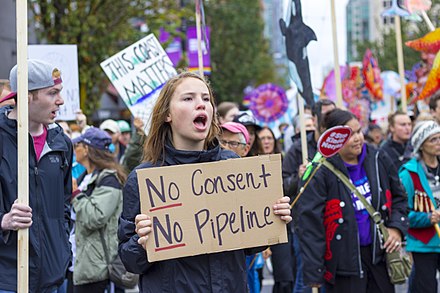Pipelines Get Political, Too Big To Punish, and Death, Taxes, and Oppositional Forces
Here’s What You Need To Know
This week, thousands of energy professionals from around the world are descending upon Washington, DC for the World Gas Conference. Held every three years, this is the first time the conference will be held “in a country that is both the world’s largest gas consumer and gas producer,” suggesting the United States has a bright energy future ahead if it can continue to safely extract resources and bring them to market.
However, in a new Morning Consult piece coinciding with the conference, Delve CEO Jeff Berkowitz writes that the continuing politicization of pipelines, regardless of what kind of fossil fuel they are transporting, poses challenges to harnessing this energy future. Especially in light of activism in British Columbia that led to Canada’s proposed $4.5 billion takeover of the Trans Mountain pipeline expansion, the energy industry needs to adapt to the reality that pipelines have gotten political.
- How Did We Get Here? Pipeline projects used to be non-controversial, with much of the opposition against them due to localized NIMBY-ism. All that has changed in today’s New Age of Activism though, where opposition has become increasingly professionalized, digitized, and globalized in an effort to delay and disrupt pipeline projects by politicizing staid bureaucratic processes and taking their case to the courts of both law and public opinion. As protests targeting the Trans Mountain pipeline expansion intensified to the point where it has some wondering if it is the “next Standing Rock,” Canadian Prime Minister Justin Trudeau blamed the uncertainty caused by activists for making the project “too risky for a commercial interest” to build. Trudeau’s ironic about-face highlights that pipelines are not just “too risky,” but have become too political – even for the famously adaptive politician.
- This Did Not Begin With Trans Mountain: Since the Keystone XL pipeline inspired a chain of activists around The White House in 2011, energy activism has grown increasingly prevalent in the political landscape, even becoming a political litmus test for Democratic candidates up and down the ticket. It then continued with the massive protests against the Dakota Access pipeline that began in the Fall of 2016, and since then has metastasized to other projects around the continent. Trans Mountain is simply the latest casualty of activist efforts.
- Welcome To The New Normal: Keystone XL, Dakota Access, and now Trans Mountain are not aberrations, and activist pressure on banks and financial institutions to divest from fossil fuel companies demonstrates the savvy tactics posing risk to the industry going forward. This is the new normal. With the trends pointing toward increased tension, confrontation, and uncertainty, the energy industry must manage and mitigate the political and reputational risk of energy activism, or else risk financial consequences that can hurt the economy and national security of the countries in which it operates.
- How Can Companies Adapt To This New Operating Environment? Existing initiatives focused on community engagement and being-a-good-neighbor policies will always have a role to play in getting pipelines built. Yet, what today’s operating environment also requires is a vigilant and proactive strategy to anticipate and mitigate the public affairs challenges of energy activism. This strategy must include understanding the networks of activism arrayed against infrastructure projects and taking steps to address them, before activists show up at construction sites and regulatory meetings, delay and disrupt pipelines, and negatively impact not only a company’s bottom-line – but also a country’s economic and national security.
Activist pressure has only continued to increase in the wake of the Canadian government’s decision to purchase the Trans Mountain expansion, reminding us that companies are not the only ones facing increased political and reputational risks, and that there is little to suggest that activism will stop until fossil fuel usage is entirely (and impractically) stopped. Read the entire op-ed in Morning Consult here.
Subscribe to Receive Insights
"*" indicates required fields
News You Can Use
DEATH, TAXES, AND OPPOSITIONAL FORCES
They say nothing is certain but death and taxes, although might we suggest another: oppositional forces. Ironically, both death and oppositional forces are key to an ongoing policy debate. Aquamation, also known as water cremation, is a method of body disposal that is legal in 15 states. While supporters consider it to be “kinder” than embalming or cremation, as well as the “most environmentally friendly method of death care,” opponents – ranging from casket-makers to the Catholic Church – have mobilized against efforts enabling its spread.
After supporters spent $40,000 lobbying one state legislature to legalize aquamation, they were dismayed when a lawmaker who was also a casket-maker derailed the initiative with a viral floor speech comparing the process to “flushing” a loved one. The takeaway? That in today’s policy environment, shoe-leather lobbying in and of itself is not enough, particularly when you can count on death, taxes, and oppositional forces.
NOT WAYFAIR WINDS AND FOLLOWING SEAS
The President may see it as “a big, big victory”, but the Supreme Court’s Wayfair decision giving state and local governments the ability to start collecting sales taxes from online retailers seems like a big, big headache for pretty much everyone else. As foreshadowed in a previous TL;DR, the ruling may lead to an open season for politicians to implement new revenue schemes and push the limits of their taxing authority.
Not only will companies and consumers have to adapt to a patchwork of state-specific laws in the absence of congressional action, small online businesses may even find themselves in local courthouses far from their location fighting the expansive new tax laws. Consumers may also begin seeing new numbers popping up in their online shopping carts and possibly even with their streaming services. Sometimes, the Court’s ruling enables clarity at the federal level on a public policy question. In this case, Wayfair instead may make that even more unlikely as state and local governments get used to the idea of a new source of revenue.
TOO BIG TO PUNISH?
In an investigative piece, CQ Magazine’s Mike Magner argues Wall Street regulators have been taking it to small firms, and in comparison, letting the big banks off the hook. Magner and Georgetown Law Professor Urska Velikonja dug into Security and Exchange Commission (SEC) enforcement data of the 1,620 cases the regulatory agency has settled since 2008, determining that 762 of those cases would have “triggered automatic” penalties under the Dodd-Frank law regulating financial institutions. However, the SEC passed on enforcing these automatic penalties in 26 percent of these cases, most of which involved most major banks and financial institutions rather than smaller firms.
The reasons cited for the disparate treatment included the reluctance to punish a large firm for the bad actions of a few individuals, the generally “more robust compliance systems” that large institutions can afford to have in place, and the negative impact such penalties could have on the financial system as a whole. Regulations such as Dodd-Frank were put in place to hold major banks and financial institutions more accountable and ensure no future financial crisis is caused by their irresponsibility, but this data shows the law aimed at addressing their past missteps may have instead hurt small banks on which many Americans depend.
PEOPLE ARE POLICY
While hundreds of key positions in the Administration remain unfilled after more than 500 days in office, the gears of government are grinding – and the people in place are the ones who are determining the direction of policy. For one example, look no further than The New York Times’ feature on the Heritage Foundation, a think-tank that has provided a list of conservatives “to serve in a post-Obama government,” and that has accomplished an impressive 64% of its policy agenda in the first year of the Administration.
The impact of people on policies and organizations is something we here at Delve are very familiar with, which is why we created our special report on understanding the Administration staffers in place last year. Because then and now, when navigating complex policy issues in a challenging environment, insights into key stakeholders are key to achieving one’s public policy objectives.



